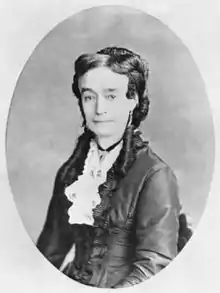Anaïs Ségalas
Anaïs Ségalas, born Anne Caroline Menard (24 September 1811, Paris – 31 August 1893, Paris) was a French playwright, poet and novelist. She was a member of Société La Voix des Femmes in Paris in 1848 and of other Parisian feminist organizations.[1]
Anaïs Ségalas | |
|---|---|
 | |
| Native name | Anne Caroline Menard |
| Born | 24 September 1811 Paris, France |
| Died | 31 August 1893 (aged 81) Paris, France |
| Resting place | Pere-Lashaise |
| Genre | Plays, novels, poetry |
| Spouse | Jean Victor Ségalas |
Life
Anne Caroline Menard was born on 24 September 1811 in the former 6th arrondissement of Paris.[2] She was the only daughter of Charles Menard and Anne Bonne Portier, a Creole from Santo Domingo.[3] Her father, Charles Menard, was a vegetarian, activist of the animal cause, misanthrope. When he died, Menard was 11 years old.[2]
Menard got acquainted with the neighbor Jean Victor Ségalas, a lawyer at the Royal Court and they got married on 17 January 1827.[4] She took the name Anaïs Ségalas and made her husband promise never to oppose her passion for writing.[2] Ségalas’ first poems were published in 1827. In 1829, La Psyché published her first essays, and in 1831 eight poems Les Algériennes appeared in La Gazette littéraire.[2][5] In mid-1830, Ségalas collaborated with a Christian newspaper Le Journal des Femmes.[1]
On 15 December 1838, Ségalas gave birth to her daughter Bertile Claire Gabrielle whom she dedicated the volume Enfantines published in 1844.[2] In 1847, Ségalas published a collection of moralizing and didactic poems of various kinds of states of woman La Femme.[3] The next year, in 1848, she became a member of Société La Voix des Femmes in Paris and of other Parisian feminist organizations.[1]
In the 1840s, Ségalas started to write theater plays. In 1847, her first play La Loge de l'Opéra, a drama in 3 acts, was performed at the Odeon theater. In the following years her plays Le Trembleur, Les Deux Amoureux de la grand’mère and Les Absents ont raison were staged in Paris theaters.[2]
In 1861, she published a collection of poetry, Idéal et Réalités.[6]
Aged 81, Ségalas wrote her last comedy in 1 act Deux passions which had a world success.
Anaïs Ségalas died on 31 August 1893 in Paris.[2] In 1917, the French Academy created the Anaïs Ségalas Prize for Literature and Philosophy, intended to reward the work of talented women.[7] The last prize was awarded in 1989.
Works
- Les Algériennes, poésies, 1831
- Les Oiseaux de passage, poésies, 1837
- Enfantines, poésies à ma fille, 1844
- Poésies, 1844
- La Femme, poésies, 1847
- Contes du nouveau Palais de Cristal, 1855
- Nos bons Parisiens, poésies, 1864
- La Semaine de la marquise, 1865
- Les Mystères de la maison, 1865
- La Dette du cœur, poésies, 1869
- La Vie de feu, 1875
- Les Mariages dangereux, 1878
- Les Rieurs de Paris, 1880
- Les Romans du wagon. Le Duel des femmes. Le Bois de la Soufrière. Un roman de famille. Le Figurant, 1884
- Le Livre des vacances. L'Oncle d'Amérique et le neveu de France. Zozo, Polyte et Marmichet. Une rencontre sur la neige, 1885
- Récits des Antilles. Le Bois de la Soufrière, 1885
- Les Deux Fils, 1886
- Poésies pour tous, 1886
- Le Compagnon invisible, 1888
Theater plays
- La Loge de l’Opér, 1847
- Le Trembleur, 1849
- Les Deux Amoureux de la grand’mère, 1850
- Les Absents ont raison, 1852
- Les Inconvénients de la sympathie, 1854
- Deux passions, 1893
References
- "Segalas, Anais née Menard". Ohio University. Retrieved 2020-09-10.
- "ANAIS SEGALAS". Histoires du Père Lachaise. 2013-05-19. Retrieved 2020-09-10.
- "SEGALAS Anaïs (1819-1895)". Amis et Passionnes du Pere-Lachaise. 2007-04-28. Retrieved 2020-09-10.
- "Collections Online | British Museum". British Museum. Retrieved 2020-09-10.
- "Anaïs Ségalas (1811-1893) – biographie – 19th-Century French Women Poets". Colby College. Retrieved 2020-09-10.
- Chloé, Antoine (September 2010). "Un journal féminin au milieu du 19e siècle : Etude du Conseiller des Dames et des Demoiselles de 1847 à 1853" (PDF). Retrieved 2020-09-10 – via CORE.
- "Prix Anaïs Ségalas | Académie française". Académie Française. Retrieved 2020-09-10.
Bibliography
- Albistur, Maïté and Daniel Armogathe. History of French feminism from the Middle Ages to the present day. 2 flights, Paris: Des Femmes, 1977.
- Beaunier, André. Faces of women. 5th ed. Paris: Plon-Nourrit, 1913.
- Cooper, Barbara T. "Race, Gender, and Colonialism in Anaïs Ségalas’s Stories from the West Indies: Le Bois de la Soufrière." In "Engendering Race: Romantic-Era Women and French Colonial Memory," edited by Adrianna M. Paliyenko, special issue, L'Esprit Créateur 47, no. 4 (Winter 2007): 118–29.
- Czyba, Luce, “Anaïs Ségalas (1814-1893)". In Women poets of the nineteenth century: An anthology, edited by Christine Planté.185-92. 2nd ed. Lyon: University Press of Lyon, 2010.
- Delaville, Camille Chartier. My contemporaries. 1st ser. Paris: P. Sévin, 1887.
- Desplantes, François, and Paul Pouthier. Women of letters in France 1890. Geneva: Slatkine Reprints, 1970.
- Jacob, Paul. “Mrs. Ségalas". In Biography of Women Authors, edited by Alfred de Montferrand, 37–47. Paris: Armand-Aubrée, 1836.
- Moulin, Jeanine. “Female poetry from the 12th to the 19th century". Paris: Seghers, 1966.
- Dried, Alphonse. The French muses: Anthology of women poets from the eighteenth to the twentieth, 2 vols. Paris: Louis Michaud, 1908–1909.
- Sullerot, Evelyne. History of the women's press in France from its origins to 1848 . Paris: Armand Colin, 1966.